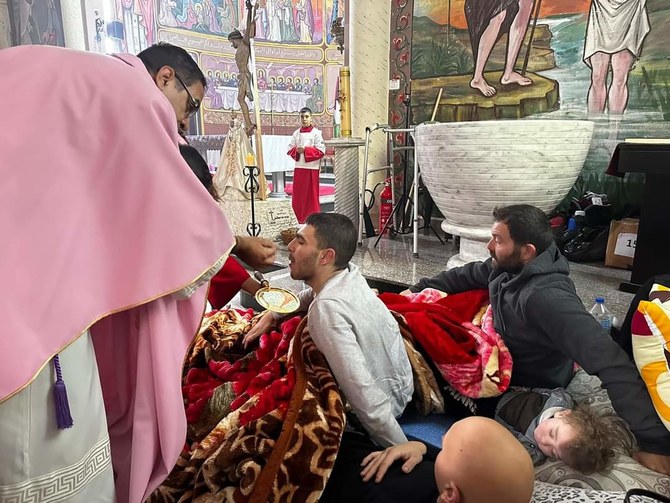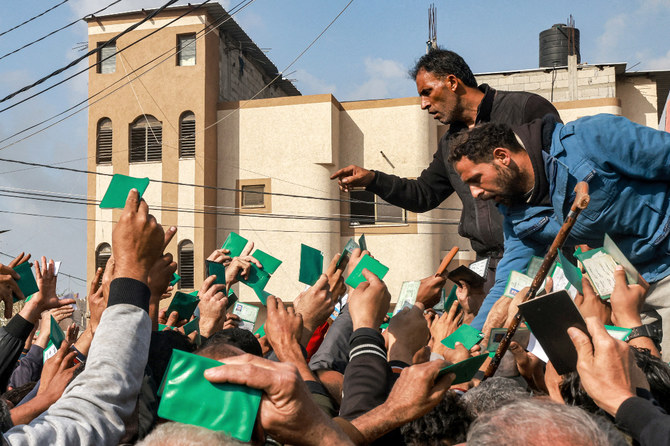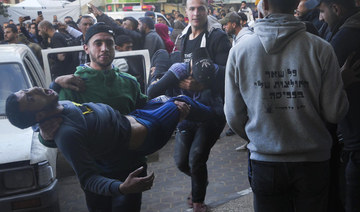LONDON: As Christmas dawns, a somber mood overshadows the Holy Land on one of the Catholic calendar’s most important dates. Since the start of Israel’s military campaign, 20,000 lives have been lost in the Gaza Strip. It is a grim statistic that casts a long shadow over what should be a time of joy and celebration.
For Cafod, the Catholic Church’s official aid agency in England and Wales, the growing death toll figures have made for grim reading. Elizabeth Funnell is the agency’s representative for its Middle East country programs, a role that brings her face to face with the harsh realities of the conflict.
“Christmas is one of the most important times of year, with many Catholics and Christians around the world making pilgrimages,” she told Arab News.
“These pilgrims make this trip looking for light, looking for hope as they enter the new year. But for many in the Holy Land, this year will be a Christmas marked by pain. Whether in Gaza or the West Bank, the region as a whole is suffering. What it needs is a ceasefire.”
Funnell was speaking just days after a mother and daughter were killed while walking in the grounds of Gaza’s only Catholic church.
The patriarchate of the Holy Family Church described the killings of Nahida Anton and her young daughter, Samar, as “cold-blooded” and laid the blame on an Israeli sniper.
The incident sent ripples of outrage and sorrow through communities worldwide, further emphasizing the dire situation in the region.
Even Pope Francis was vocal in his response to the events. In a public address, he lamented the deaths and criticized the targeting of “unarmed civilians” in Gaza.
“I continue receiving very serious and sad news about Gaza,” he said at the end of the Angelus prayer.
“Some are saying this is terrorism and war. Yes, it is war, it is terrorism … let us pray to the Lord for peace in these troubled times.”
Funnell said there was now a critical need for more humanitarian aid to enter Gaza.
“Before Oct. 7, an average of 500 aid trucks would pass daily through the Rafah border into Gaza,” she said. “Yesterday, however, we saw a drastic reduction, with only 104 trucks managing to cross.”
Despite Cafod’s ongoing efforts, Funnell said the demand for aid was escalating, including the need for the local currency Gazans need to buy essential items.
“We work with local partners who’ve done a huge amount to procure supplies from local markets and we’ve got some aid in, eight trucks and another 13 waiting in the last 24 hours,” she said.
It was now vital that commercial crossings were reopened, she said.
“If we can get those opened, that will add to the supplies that NGOs and charities can supply via aid crossings. We are pushing the UK government to in turn push the Israelis to open these crossings.”
Funnell called for global solidarity with the Pope’s appeal for a peaceful resolution to the conflict and encouraged supporters to engage with their political representatives.
“We’ve been asking supporters to write to their MPs. It’s so important that we raise our voices, joining the pope, who has been very outspoken on the need for a political solution.”
She also highlighted the underlying causes of the conflict and their impact on the people of Gaza, notably the young who face bleak employment prospects.
“I think this is something we really want to stress,” she said. “Gaza is full of so many with high levels of education and yet they lack for opportunities despite having shown great ingenuity in creating work for themselves, whether through marking, online coding or translation work.
“But the conditions of the occupation, including electricity and internet outages (even before the war) have tested the resolve of even the Strip’s most resilient.”
Funnell said international and Israeli leaders needed to understand how the occupation restricted Palestinians.
“As Pope Francis said, what we need is a solution that brings peace and security for everyone.
“It’s a political problem that demands a political solution, which is the only path to true and lasting peace.”





























